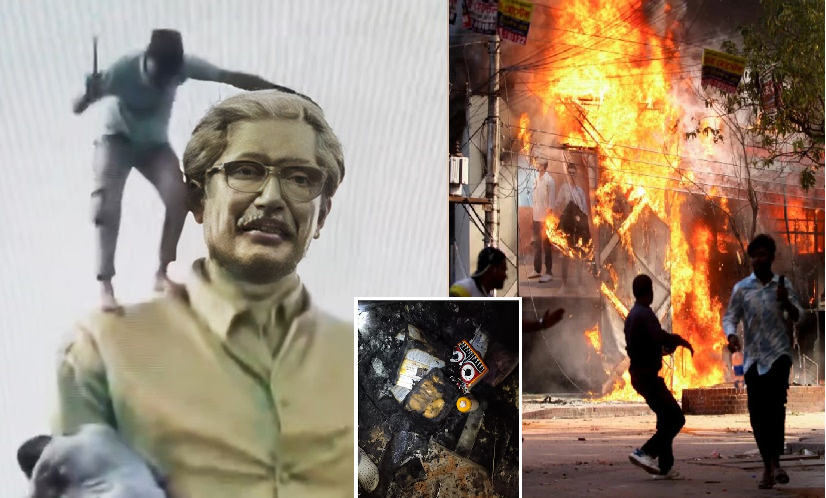
- The so-called ‘student protests’ in Bangladesh have taken a troubling turn, targeting minorities, specifically Hindu minorities, and damaging religious institutions such as Hindu temples and ISKCON temples.
- Prime Minister Hasina resisted American pressures, asserting that the U.S. was interfering in Bangladeshi politics to create instability in the country.
- Turmoil in Bangladesh poses a significant security dilemma for India as Sheikh Hasina’s fall has not only destabilized Bangladesh but has also created multiple strategic concerns for India.
In a dramatic turn of events, Bangladeshi Prime Minister Sheikh Hasina has resigned from her position, leaving the country in chaos. The military has taken control amid ongoing ‘student protests‘ that have been occurring in Bangladesh for the past two months. Students have been demanding the abolition of a reservation system that allocates nearly 40% of government jobs to army personnel and the families of those who fought for the independence of Bangladesh.
The protests escalated into deadly confrontations, resulting in the deaths of over 300 civilians. Following her resignation, Prime Minister Sheikh Hasina and her family were urgently evacuated from Bangladesh to India. They are expected to move from India to the United Kingdom, where they plan to take up residence.
‘Student Protests’ or Islamist Intervention?
The major question lies in the intensity of the protest. Many believe that the protests are not as organic as they appear. Firstly, there was no fault on Prime Minister Sheikh Hasina’s part, as she had already scrapped the reservation system in 2018. It was the High Court of Bangladesh that, in June, reinstated the reservation system.
The ongoing protests, therefore, should not have been directed against Prime Minister Hasina. The highly violent nature of the protests raises doubts about their authenticity as student-led movements. The protests have caused extensive damage to the basic infrastructure and institutions in Bangladesh. Protesters even stormed the parliamentary building and the Prime Minister’s residence, and they toppled the statue of Sheikh Mujibur Rahman, the father of Sheikh Hasina and the first Prime Minister of Bangladesh. The so-called ‘student protests’ in Bangladesh have taken a troubling turn, targeting minorities, specifically Hindu minorities, and damaging religious institutions such as Hindu temples and ISKCON temples. Currently, there have been numerous attacks on minorities, particularly Hindus in Bangladesh. This raises the question: if these were genuinely student protests, why are minorities being targeted?
This suggests that there may be underlying motives beyond the initial student demands, potentially involving opposition groups with unholy alliances aimed at removing Prime Minister Hasina. The nature and actions of the protests do not appear to be organic or purely student-led.
US Involvement
In this whole saga, one notable event was the international response, particularly from the United States of America. The U.S. has called for the stabilization of democracy in Bangladesh and urged a smooth transition of power. However, it is interesting to note the particular relationship that Prime Minister Sheikh Hasina had with the United States.
Prime Minister Hasina was often very critical of the U.S. She believed that the U.S. was trying to secure a military base and establish a Christian stronghold in Bangladesh, which she opposed. Prime Minister Hasina resisted American pressures, asserting that the U.S. was interfering in Bangladeshi politics to create instability in the country.
A particularly notable development was the sudden departure of the American Ambassador to Bangladesh, Peter Haas, who secretly left the country on July 25th. This raises many questions about his departure and the ongoing tensions between the U.S. and Bangladesh. The situation indeed leaves much to be scrutinized regarding the motives and actions of the involved parties.
However, one notable and surprising development was the reporting and coverage by OSINT and many independent media outlets. Many of these media outlets, that identify as either anti-USA, pro-Russia, or pro-Global South, have been criticizing Prime Minister Hasina and calling for her resignation, labelling her a dictator. This is even though the United States’ alleged unholy alliance has contributed to the fall of her government.
These media outlets’ stance is particularly surprising given their usual criticism of the United States on issues related to Ukraine and Palestine. However, when it comes to matters involving India or its territory, their tone change. This raises questions about potential bias, especially considering their apparent sympathy towards Pakistan.
What’s Next for Bangladesh
Just hours after Prime Minister Sheikh Hasina left, the President of Bangladesh ordered the release of the imprisoned opposition leader Khaleda Zia, who had been jailed by the Awami League party. This raises questions about a potential unholy alliance between the military and the opposition.
A notable development is the possible future of the opposition parties in Bangladesh, specifically the Bangladesh Nationalist Party (BNP) and Jamaat-e-Islami. It is expected that the BNP, led may take the lead in forming the next government. The BNP, which includes army veterans, has close ties with the Bangladeshi military, Pakistan, China and the USA.
Whatever happens to Bangladesh, one thing is certain: Turmoil in Bangladesh poses a significant security dilemma for India as Sheikh Hasina’s fall has not only destabilized Bangladesh but has also created multiple strategic concerns for India. There is a concern that illegal infiltrations and a rise in terrorism may occur in the northeastern part of India.
India must take on the responsibility of addressing and mitigating these challenges. For Bangladesh, a country once considered to be the next economic growth engine, this sudden turn of events is concerning. It will be interesting to see if peace and stability can be restored. However, achieving political stability in Bangladesh now seems very challenging.
(Views expressed are the author’s own)
Aayush Pal is a freelance writer on contemporary geopolitical developments. The views expressed in his work are entirely his own.
